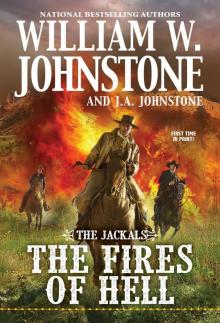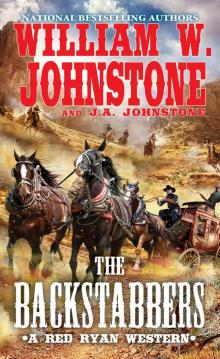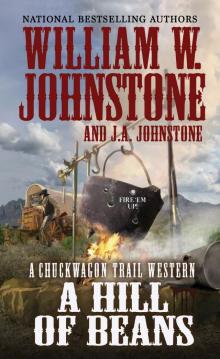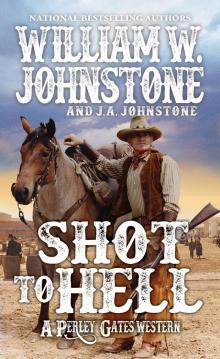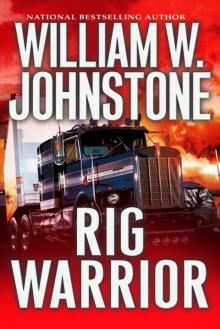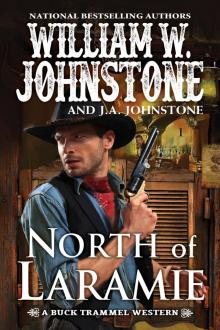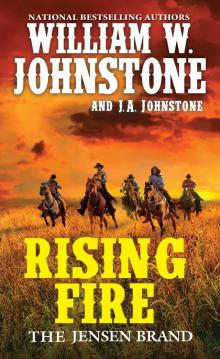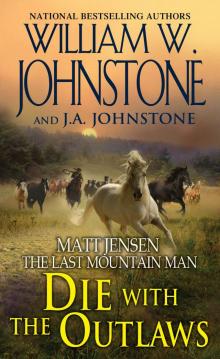The fires of hell, p.1
The Fires of Hell, page 1





Look for these exciting Western series
from bestselling authors
William W. Johnstone and J.A. Johnstone
The Mountain Man
Luke Jensen: Bounty Hunter
Brannigan’s Land
The Jensen Brand
Preacher and MacCallister
The Red Ryan Westerns
Perley Gates
Have Brides, Will Travel
Guns of the Vigilantes
Shotgun Johnny
The Chuckwagon Trail
The Jackals
The Slash and Pecos Westerns
The Texas Moonshiners
Stoneface Finnegan Westerns
Ben Savage: Saloon Ranger
The Buck Trammel Westerns
The Death and Texas Westerns
The Hunter Buchanon Westerns
Tinhorn
Will Tanner: U.S. Deputy Marshal
THE JACKALS
THE FIRES OF HELL
WILLIAM W. JOHNSTONE AND J.A. JOHNSTONE
PINNACLE BOOKS
Kensington Publishing Corp.
www.kensingtonbooks.com
All copyrighted material within is Attributor Protected.
Table of Contents
Also by
Title Page
Copyright Page
PROLOGUE
CHAPTER 1
CHAPTER 2
CHAPTER 3
CHAPTER 4
CHAPTER 5
CHAPTER 6
CHAPTER 7
CHAPTER 8
CHAPTER 9
CHAPTER 10
CHAPTER 11
CHAPTER 12
CHAPTER 13
CHAPTER 14
CHAPTER 15
CHAPTER 16
CHAPTER 17
CHAPTER 18
CHAPTER 19
CHAPTER 20
CHAPTER 21
CHAPTER 22
CHAPTER 23
CHAPTER 24
CHAPTER 25
CHAPTER 26
CHAPTER 27
CHAPTER 28
CHAPTER 29
CHAPTER 30
CHAPTER 31
CHAPTER 32
CHAPTER 33
CHAPTER 34
CHAPTER 35
CHAPTER 36
CHAPTER 37
CHAPTER 38
CHAPTER 39
CHAPTER 40
CHAPTER 41
CHAPTER 42
CHAPTER 43
CHAPTER 44
CHAPTER 45
CHAPTER 46
EPILOGUE
Teaser chapter
PINNACLE BOOKS are published by
Kensington Publishing Corp.
119 West 40th Street
New York, NY 10018
Copyright © 2023 by J.A. Johnstone
This book is a work of fiction. Names, characters, businesses, organizations, places, events, and incidents either are the product of the authors’ imagination or are used fictitiously. Any resemblance to actual persons, living or dead, events, or locales is entirely coincidental.
To the extent that the image or images on the cover of this book depict a person or persons, such person or persons are merely models, and are not intended to portray any character or characters featured in the book.
All rights reserved. No part of this book may be reproduced in any form or by any means without the prior written consent of the Publisher, excepting brief quotes used in reviews.
PUBLISHER’S NOTE: Following the death of William W. Johnstone, the Johnstone family is working with a carefully selected writer to organize and complete Mr. Johnstone’s outlines and many unfinished manuscripts to create additional novels in all of his series like The Last Gunfighter, Mountain Man, and Eagles, among others. This novel was inspired by Mr. Johnstone’s superb storytelling.
If you purchased this book without a cover you should be aware that this book is stolen property. It was reported as “unsold and destroyed” to the Publisher and neither the Author nor the Publisher has received any payment for this “stripped book.”
PINNACLE BOOKS, the Pinnacle logo, and the WWJ steer head logo Reg. U.S. Pat. & TM Off.
ISBN: 978-0-7860-4959-2
ISBN-13: 978-0-7860-4960-8 (eBook)
PROLOGUE
To the Editor of The Emigrant City Weekly
Clarion & Light:
Dear Sir:
A copy of your newspaper from the 23rd inst. came into my possession after it had been discarded on a stagecoach in Purgatory City and shown to me for amusement. At least, I am merely guessing that was the fool’s reason for bringing that rag, wadded up and stained from the mud wagon’s floor and dust from its travels from your city far to the north and east.
I was not amused, as the lad learned when he left with, as I read in another one of your articles in the edition of the 23rd inst., “his tail tucked between his legs.”
While I did enjoy looking at your advertisements for cigar manufacturers, and the piano salesman, and Mr. Bowman’s Fine Art Gallery and Photography, and the bookstore owned by Madam Woodlawn, and the houses for sale, and your very own architect and builder of the new steam sawmill, and all those attorneys, the lots for sale, the dental surgeon, and, gosh, Oswego Corn Starch For Puddings, Blanc Mange, Ice Cream, Etc., and so many tonic pills and clothiers and treatments for epilepsy or fits, cookstoves and the next meeting of the Agricultural and Mechanical Association—alas, I won’t be able to attend the next fine session—and your timetables for your riverboats and railways, so many luxuries that we just don’t seem to get out here, far removed from civilization that you most certainly have in Emigrant City.
What I did not enjoy, sir, was that article on Page 4. Your last page.
If you don’t recall the article, it is the one butted up against the ad for the Fulton & Schneider General Store announcing the Staple and Fancy Dry Goods, Silks, Hosiery, Notions, Dress Trimmings, Ribbons, Kid Gloves, Ties, Parasols, Fans, Hair Braids, Corsets (French and American), Bleached Domestics, Gents’ Furnishings, Carpets, Wall Paper, Straw, Fur, and Woolen Hats, Hardware and Crockery and “Showing Goods To You Is NEVER a Problem.”
We had a store almost like that here in Purgatory City till Sean Keegan tore down half of it in a brawl last week, although I don’t think Mr. Pendergrass stocked corsets, French or American.
The headline of the article was “Forth Jackal in Purgatory City! Fine Traders Butchered by West Texas Renegades. A Cry for Law and Order. Texas Rangers at Wit’s End. Barbarous Butchers Call Honest Traders RENEGADES. But The TRUE Renegades are Revealed. And THEY are THE JACKALS. Once Three, Now FOUR! JUSTICE DEMANDED!”
My, oh, my. That sure looks like a lot of headline for a story that is but six paragraphs long. Please pardon my ignorance about English and spelling and such, being an uneducated rube from the far frontier and not of your civilized city of railroads, riverboats, and universities whilst you proudly point out being a newspaper editor for more than twenty-nine years, but should not Forth be Fourth?
Let me point out some glaring factual errors in this article you deemed worthy of publication.
In the first paragraph, you identify Purgatory City’s “resident Jackals” being led by Captain Mike McCullock, a former Texas Ranger. Well, MATTHEW McCulloch is indeed a former Texas Ranger—driven out of that valiant organization by politics, not justice—but he never served as a captain. You call him a notorious horse thief. He catches wild mustangs, sir. Usually, he’s only stealing them from the herd of wild mustangs. Horse thieves, as you have rightfully pointed out, are among the lowest dregs of humanity and they are often summarily executed. Very true. Out here, where a person’s life might very well depend on his horse, we West Texans tend to regard horses as our best friends when the chips are down. So when a man steals a horse, he puts the horse’s owner’s life at risk. And I have seen at least one man who was hanging from a telegraph pole for stealing a horse. However, Matthew McCulloch, as far as I know—and I know him pretty well—has never once hanged a horse thief. Granted, he has beaten one or two to a pulp, and he said he shot Grover Blue in the thigh when that rapscallion tried to steal a fine stallion with some thoroughbred running in its blood, but McCulloch knows the laws of Texas. And stealing a horse has never, ever, been a capital offense.
Likewise in your narrative, you missed your aim in your description of Sean Keegan, who I have previously mentioned in this letter. But at least you spelled his name right. However, Sean Keegan, who like many a good Irishman and many a Yankee soldier does enjoy a go at fisticuffs every now and then—quite possibly, he’s brawling somewhere as I write these words, and quite probably he’s knocking a tooth loose while you read my letter—but you call him a former Army Captain. Why, sir, such a libel as that would send Sean Keegan riding hell bent for leather from here to Emigrant City to challenge you to a fight for the sake of his County Cork honor. Sean Keegan would never have accepted an officer’s commission. During his valiant service in the postwar Army, he was a sergeant—many times a sergeant, when he wasn’t being stripped of a stripe and bumped down to corporal or rank trooper for defending his Irish honor or, more than likely, having one or twenty too many rounds of his beloved Irish whiskey.
And, lastly, there is your description of Jeb Breene. Jed. With a D. Not Jeb with a B. And Breen without an E at the end. You call Jed a bounty KILLER. The proper term, sir, is bounty HUNTER. Yes, Jed Breen has killed, but only when his life or someone else’s life was at risk. While he has the reputati
Now about those “traders” you refer to as honest, law-abiding merchants. I suppose they are traders, although I don’t think the law allows for what they have been trading. Recently, hundreds of thousands of Americans died to end the barbaric—yes, I say this as a Texan—practice of slavery. Traders might be one way to describe them. White slavers is another, although that is not entirely accurate, either, for these so-called traders you describe as “Fine” and “Honest” dealt Indians from Mexico and New Mexico Territory, and Mexicans from south of the Rio Grande and even some from the fine state of Texas, and, yes, whites too. White, Indian and Mexican women and children, especially young boys who could be sold to work as slaves in the mines down in Mexico. “Fine” and “Honest,” Mr. Editor, are not adjectives I would ever use to describe a Comanchero.
They aren’t even human beings. They are, instead, the “Barbarous Butchers” and “True Renegades”—and they are the foul, evil vermin who have the Texas Rangers and US Army and sheriffs and citizens of the westernmost reaches of our state at our wits’ end. They sell guns and liquor and ammunition and women and children to the last Comanche holdouts—hence, their name, Comancheros—and lately, the Apaches who come up from south of the border or from New Mexico and/or Arizona territories, even Cheyennes and Kiowas. Comancheros are dung. They should be wiped off the face of the earth.
Honest Traders? Ask your wife, your daughter, your mistress, your mother, your grandmother if they would rather do business with a Comanchero or your glorious and wonderful Fulton & Schneider General Store.
The candle is about to burn out, and my fingers are cramping from holding this pencil for so long, so I must close this letter but not before I point out your final error. That regards to the Fourth or Forth Jackal.
If Killing a Dozen traders (i.e., Comancheros) makes me a Jackal, I will gladly take that honor. In fact, when such a title was first handed to me, I felt pride almost boiling over. Sir, in West Texas, human beings, red, white, black, brown, kill other human beings, red, white, black, brown, to stay alive. To protect their loved ones. To survive another day when lightning, rain, smallpox or some other disease, not to mention childbirth, or a horse’s hoof or a horse’s stumble can kill you just as dead as a gunman’s bullet or a Comanche arrow.
But, sir, I must protest your libelous claim that I, the Fourth—or Forth—Jackal killed a dozen honest traders. They were certainly not honest. I doubt if they ever heard the word. But only a dozen?
Why you low-down, lying fool. I am sure I cut down at least thirty. But no more than forty-five of those wretched, evil men. And I hope to double that if ever I run into more Comancheros.
Unsigned.
A Perdition County Citizen
P.S.: Pardon my West Texas ignorance again, but . . . what exactly is Blanc Mange?
CHAPTER 1
The bullet whined off the rock the moment Sean Keegan looked up. Gravel and dust kicked into his eyes and sent him sliding back behind the big chunk of granite for cover.
Cover? The chunk of lead that had briefly blinded Keegan whined past Keegan’s right ear, slammed into the canyon wall a few feet behind him, and zinged back—the lead now cut in half. One chunk struck the rock about an inch or two from Keegan’s right arm, the one holding his Springfield carbine. The other spit up sand in front of Keegan and thumped harmlessly against the former cavalry trooper’s left boot.
“Confound it, Jed!” Keegan shouted to his partner. “I liked to have just been crippled on account of you.”
Another gunshot rang out from the dugout down the hill. That bullet hit the canyon wall and zinged off into oblivion.
Sean Keegan cursed again. Cursed, while cringing like a yellow-bellied coward or some greenhorn trooper. A soldier might eventually get used to the sound of gunfire, but the noise of a ricocheting bullet put the fear of the Almighty into even the most hardened veteran.
“Stick your head over that stone again, Sean.”
Keegan turned to give his meanest look at Jed Breen, but that was just a waste of effort.
The white-haired bounty hunter wasn’t even looking in Keegan’s direction. He crouched about twenty feet off to Keegan’s right, the barrel of his heavy Sharps rifle propped up in the “V” of his shooting sticks, the stock braced against his right shoulder, and Breen’s right eye staring through the long brass telescopic sight affixed to the barrel of the .50-caliber cannon.
“I mean it,” Breen said. His head never moved from the Sharps. Had he not spoken, Keegan could not have determined if his “ol’ pardner” in this affair were still living. A man couldn’t even tell if Jed Breen was breathing. He resembled some old juniper, dead but standing till Judgment Day.
“I didn’t join up with you to get my head shot off,” Keegan said.
“That’s a Winchester,” Breen said, still not looking away from the brass scope. “Not even a .44 caliber. Must be .38-40. We’re a hundred and thirty, forty, no more than a hundred and fifty yards away. And he’s shooting uphill. Not very much chance that he’ll shoot your head off. Thick as your skull is.”
Keegan felt his blood rushing again, the way it was prone to do when he found himself working alongside Jed Breen. That blood pressure might blow off his head.
“He still might kill me,” Keegan said.
“Didn’t say he wouldn’t kill you,” Breen said, still focusing on the dugout. “What I said was he wouldn’t shoot your head off.”
After choking down the curse, Keegan gathered his rifle and crossed his legs to see if that bullet fragment had done any damage to his boot. He could just make out a dent in the heel, but he had seen rougher damage done by mesquite and stones. So he twisted around, wiped his palms on his shirt front, and decided to look around the left corner of his boulder. Wetting his lips, he brought the Springfield’s barrel over, bracing it against a natural groove in the side of the granite, and aimed at the dugout.
He saw the flash below, the white smoke, heard the report of the Winchester, and felt the heat as the bullet screamed past his ear. That slug tore through a heart-shaped prickly pear and whined off another rock. No, not quite a whine. Just a ping.
But Keegan had pulled himself back, shaking his head, feeling the blood roaring like an express train, and tried to catch his breath.
“That must be Billy Ray,” Breen said. “Darn good shot, Billy Ray. Much better than his brother. With a rifle, anyway. Six-shooter, too. I don’t think Jim Bob was ever good at anything except with a running iron on other men’s cattle.”
“You told me that rustlers usually don’t put up much of a fight!” Keegan yelled.
“They aren’t just rustlers anymore. They are escaped convicts.”
Keegan’s mouth tasted like sand. He wanted to spit, but his tongue was drier than this patch of misery. “You could at least take a shot at those outlaws,” he growled. “So they wouldn’t keep taking potshots at me.”
Suddenly, Keegan got mad. He crouched, brought the Springfield to his shoulder, pulled back the hammer, and quickly spun around, fired, and ducked back behind the rock. The carbine’s report drowned out any satisfaction he might have gotten by hearing the bullet strike anything—man, dugout, tree, cactus, boulder, or even one of the two horses in the corral about twenty yards east of the dugout.
A moment later, he heard laughter from below. Then a Texas drawl: “That the best you can do, pardner?”
“No. Don’t have a shot.” Breen was calm as a night sky. And it took a moment before Keegan realized the bounty hunter was addressing Sean Keegan. “Dugout’s walls must be three feet thick, probably with some stone in there. Only one opening, the door, and whoever’s shooting is too far back for me to hit him. So I figure, let him waste his lead. I know what they say about a repeating rifle, that you can load it on Monday and shoot till Sunday. But that’s not true. And .38-40 cartridges are hard to find in this country.”

